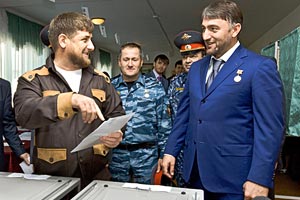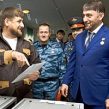
Observers and Locals Question Municipal Elections in Chechnya and Ingushetia
Publication: Eurasia Daily Monitor Volume: 6 Issue: 187

Local elections were held across Russia on October 11, with Chechnya and Ingushetia holding municipal elections for the first time. Opponents of the Kremlin said that the elections, held in 75 out of Russia’s 83 regions and won overwhelmingly by the Russian Prime Minister Vladimir Putin’s United Russia party, were unfair, and observers in Chechnya, Ingushetia and Dagestan questioned the fairness of local polls.
In the first mayoral elections ever held in Grozny, the incumbent Mayor Muslim Khuchiev was re-elected with more than 87 percent of the vote, and turnout in the Chechen capital was reported at 91.48 percent. Turnout across Chechnya was 86 percent, although the republic’s president, Ramzan Kadyrov, had promised that 99 percent of Chechnya’s voters would go to the polls (RIA Novosti, October 12).
Chechnya’s human right ombudsman, Nurdi Nukhazhiev, said that the elections in Chechnya took place without any violations, declaring them “yet another big victory for Chechen society and the president of the republic, Ramzan Kadyrov” (RIA Novosti, October 12). The government newspaper Rossiyskaya Gazeta quoted Russian President Dmitry Medvedev as saying that the elections in Chechnya and neighboring Ingushetia “demonstrated that people in these republics want to participate in the creation of municipal government bodies” (www.rg.ru, October 13).
A correspondent for the Gazeta.ru website who worked as an observer for the Communist Party of the Russian Federation (KPRF) at polling station No. 13 in Grozny said that the official turnout figures for the republic as a whole were much higher than the turnout at that voting station. For example, while the head of Chechnya’s election commission, Ismail Baikhanov, said that as of 10.00 a.m., local time, on October 11, the turnout across the republic was 13.5 percent, the Gazeta.ru correspondent reported that at polling station No. 13, located in the Zavodsky district in the center of the Chechen capital, only 45 people had voted, which was less than 2 percent of the total number of registered voters. By 4:00 p.m., officials were claiming that turnout in Chechnya had already reached 69 percent, but the Gazeta.ru correspondent had counted only 456 people as having voted at polling station No. 13 –less than 20 percent of registered voters. By the time the polls closed at 8.00 p.m., local time, the correspondent had counted 1,059 voters who had cast ballots at polling station No. 13 –around 43 percent of those registered. That was half of the final official turnout for Chechnya as a whole –86 percent.
The Gazeta.ru correspondent wrote that while her count of the number of voters at polling station No. 13 might have had a margin of error of around 90 people at the most, the final official results showed that 73 percent of those registered to vote there had done so –meaning that the difference between her count and the official one was 700 voters. “I believe the members of the election commission of polling station No. 13,” she wrote. “They are wonderful people. But I also believe my own eyes. It is not possible that I did not notice 700 people” (www.gazeta.ru, October 12).
Kavkazsky Uzel quoted a local Grozny resident, Zareta Inalova, as saying of the municipal elections in Chechnya: “The fact some officials in some cases will replace others will, at the end of the day, change nothing. All the parties and candidates love to make noisy promises before elections, and then [afterwards] all expect to go down well-worn paths. Officials start to feel more at home in their new jobs and see their positions, above all, as means of quick and easy profits, and they simply do not think about the needs of ordinary citizens.”
The website quoted another Grozny resident, Alikhan, as saying: “Officials are a separate caste of people, who live for themselves and by their own roles. I am completely indifferent about who will be mayor of the city or district today or tomorrow, because they will not help me personally; I knew that a long time ago. I have not been able to get compensation for my destroyed home since 2004. I went to practically all the officials, starting with the heads of the village, the district, the mayor of Grozny, and ending with the deputies in parliament. They all sent me off to other officials. And I do not believe that the appearance of new people in official posts will seriously change anything” (www.kavkaz-uzel.ru, October 12).
In Ingushetia, the turnout for the October 11 municipal elections was 80 percent –lower than the 99 percent turnout in the republic for the most recent Russian presidential and parliamentary elections. The Gazeta.ru website’s correspondent in the republic wrote that when he went to one polling station on October 11 and started to count each voter who came through and recorded it in a notebook, a group of people (he did not identify them, but they were apparently Ingush election officials) forced him, “with that persistence characteristic of the Caucasus, reinforced with a smile and the display of a gas pistol,” to “observe the elections as a holiday of the Ingush people.” They “insistently asked” him to write that the turnout was 95 percent, he wrote (www.gazeta.ru, October 12). Kavkazsky Uzel quoted Ingush opposition activists as saying that the election campaign had been plagued by violations and referred to the vote as “another disgrace” (www.kavkaz-uzel.ru, October 12).
The situation was even worse in the Dagestani city of Derbent, where many polling stations reportedly failed to open and police allegedly harassed voters and journalists. The Associated Press quoted Emergency Ministry spokesman Oleg Ugnivenko as saying that 12 of 36 polling stations in Derbent did not open because election officials received threats from unspecified militants. Kavkazsky Uzel claimed on October 11 that an election official was kidnapped the previous evening, but officials denied the claim (RIA Novosti, AP, October 12; www.kavkaz-uzel.ru, October 11).




